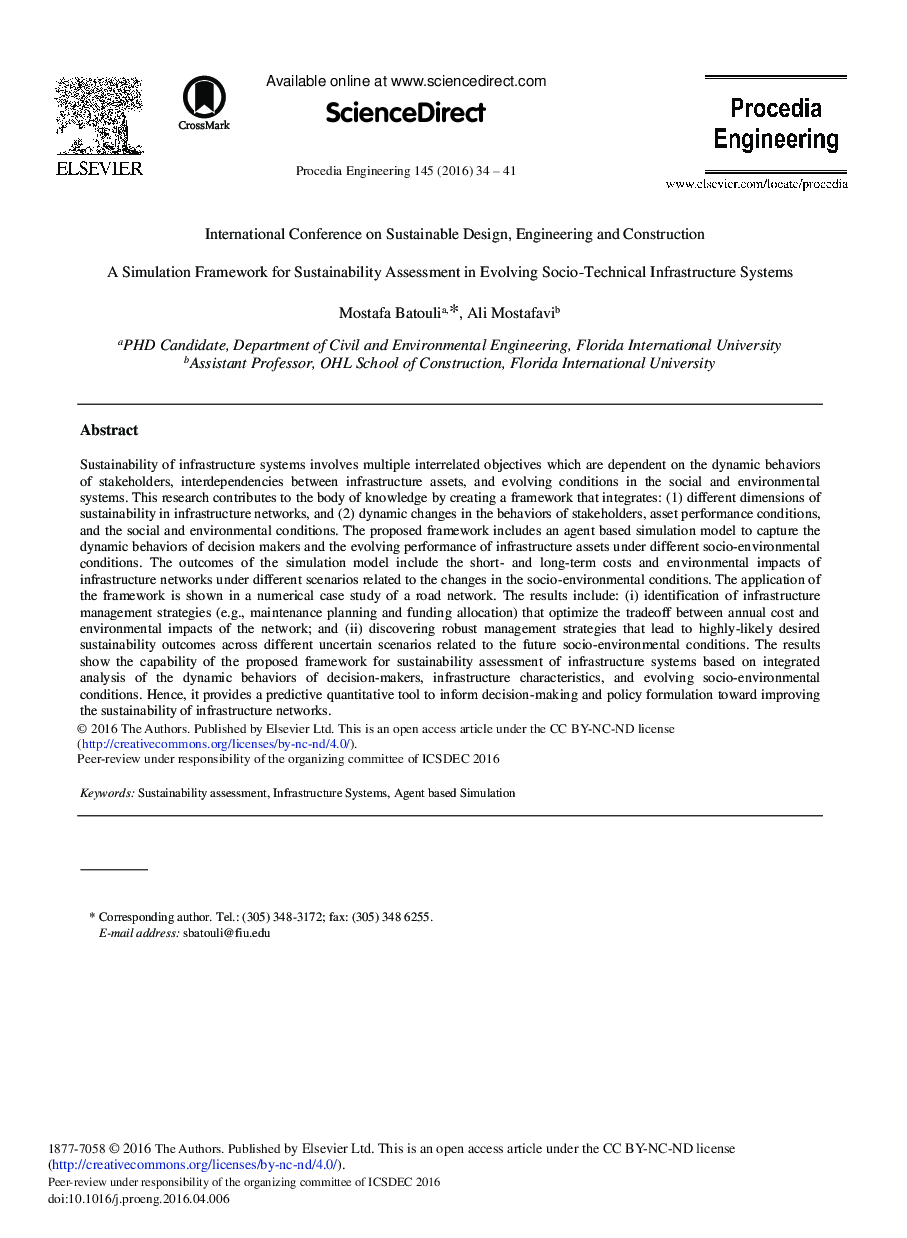| کد مقاله | کد نشریه | سال انتشار | مقاله انگلیسی | نسخه تمام متن |
|---|---|---|---|---|
| 853646 | 1470681 | 2016 | 8 صفحه PDF | دانلود رایگان |
عنوان انگلیسی مقاله ISI
A Simulation Framework for Sustainability Assessment in Evolving Socio-Technical Infrastructure Systems
ترجمه فارسی عنوان
یک چارچوب شبیه سازی برای ارزیابی پایداری در تکامل سیستم های زیربنایی اجتماعی و فنی
دانلود مقاله + سفارش ترجمه
دانلود مقاله ISI انگلیسی
رایگان برای ایرانیان
کلمات کلیدی
ارزیابی پایداری، سیستم های زیربنایی، شبیه سازی مبتنی بر عامل،
ترجمه چکیده
پایداری سیستم های زیربنایی شامل چندین اهداف مرتبط است که وابسته به رفتار پویا ذینفعان، وابستگی متقابل بین دارایی های زیربنایی و شرایط تحول در سیستم های اجتماعی و محیطی است. این تحقیق با ایجاد یک چارچوب که یکپارچه سازی می کند: (1) ابعاد مختلف پایداری در شبکه های زیربنایی و (2) تغییرات پویا در رفتار ذینفعان، شرایط عملکرد دارایی و شرایط اجتماعی و محیطی، به دانش بدنی کمک می کند. چارچوب پیشنهادی شامل یک مدل شبیه سازی مبتنی بر عامل است تا رفتارهای دینامیکی تصمیم گیرندگان و عملکرد در حال رشد دارایی های زیربنایی را تحت شرایط مختلف اجتماعی و محیطی ترسیم کند. نتایج مدل شبیه سازی شامل هزینه های کوتاه مدت و بلند مدت و اثرات زیست محیطی شبکه های زیربنایی تحت سناریوهای مختلف مربوط به تغییرات در شرایط اجتماعی-محیطی است. کاربرد چارچوب در یک مطالعه عددی از یک شبکه جاده نشان داده شده است. نتایج عبارتند از: (1) شناسایی راهبردهای مدیریت زیرساخت (به عنوان مثال، برنامه ریزی تعمیر و نگهداری و تخصیص بودجه) که بهینه سازی سود بین هزینه سالانه و تاثیرات زیست محیطی شبکه را بهینه می کند. و (2) کشف استراتژی های مدیریت قوی که منجر به نتایج قابل قبول پایداری مطلوب در سراسر سناریو های نامطمئن مختلف مربوط به شرایط اجتماعی-محیطی آینده می شود. نتایج نشان می دهد قابلیت چارچوب پیشنهادی برای ارزیابی پایداری سیستم های زیرساخت براساس تجزیه و تحلیل یکپارچه رفتارهای پویا تصمیم گیرندگان، ویژگی های زیرساخت ها و تحول شرایط اجتماعی و محیطی است. از این رو، یک ابزار پیش بینی کننده کمی برای اطلاع دادن به تصمیم گیری و فرمول سیاست ها در جهت بهبود پایداری شبکه های زیرساخت فراهم می کند.
موضوعات مرتبط
مهندسی و علوم پایه
سایر رشته های مهندسی
مهندسی (عمومی)
چکیده انگلیسی
Sustainability of infrastructure systems involves multiple interrelated objectives which are dependent on the dynamic behaviors of stakeholders, interdependencies between infrastructure assets, and evolving conditions in the social and environmental systems. This research contributes to the body of knowledge by creating a framework that integrates: (1) different dimensions of sustainability in infrastructure networks, and (2) dynamic changes in the behaviors of stakeholders, asset performance conditions, and the social and environmental conditions. The proposed framework includes an agent based simulation model to capture the dynamic behaviors of decision makers and the evolving performance of infrastructure assets under different socio-environmental conditions. The outcomes of the simulation model include the short- and long-term costs and environmental impacts of infrastructure networks under different scenarios related to the changes in the socio-environmental conditions. The application of the framework is shown in a numerical case study of a road network. The results include: (i) identification of infrastructure management strategies (e.g., maintenance planning and funding allocation) that optimize the tradeoff between annual cost and environmental impacts of the network; and (ii) discovering robust management strategies that lead to highly-likely desired sustainability outcomes across different uncertain scenarios related to the future socio-environmental conditions. The results show the capability of the proposed framework for sustainability assessment of infrastructure systems based on integrated analysis of the dynamic behaviors of decision-makers, infrastructure characteristics, and evolving socio-environmental conditions. Hence, it provides a predictive quantitative tool to inform decision-making and policy formulation toward improving the sustainability of infrastructure networks.
ناشر
Database: Elsevier - ScienceDirect (ساینس دایرکت)
Journal: Procedia Engineering - Volume 145, 2016, Pages 34-41
Journal: Procedia Engineering - Volume 145, 2016, Pages 34-41
نویسندگان
Mostafa Batouli, Ali Mostafavi,
